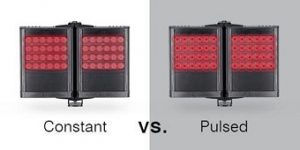
Intelligent Transport Systems (ITS) are a combination of advanced information and communication technologies used in transportation and traffic management systems to enhance the efficiency, safety and sustainability of transportation networks. Lighting is an essential part of an effective transport system, but when designing your Intelligent Transport System, you need to consider what ‘type’ of lighting suits your project.
There are two different approaches to this type of scenario ‘constant’ and ‘pulsed’ illumination.
Constant Illumination is when a light is switched on 100% of the time, usually due to a specific user requirement, where they want the light to be constantly available. However, for LPR/ANPR applications the camera is not constantly capturing images, for every frame it is effectively taking a 1,000th of a second snapshot.
Pulsed Illumination refers to fast flashes of light that syncs directly with the cameras shutter. Using pulsed lighting provides on-demand lighting to accurately record imagery of fast-moving objects. The illuminator can be synced with the camera’s shutter via a digital input to ensure there are maximum levels of light when required. Pulsed lighting is usually triggered by a moving vehicle.
According to Raytec, pulsed illumination provides a number of advantages over constant lighting when being used for transport applications. Some of the main benefits include:
Power
When the illuminator is pulsed, it is only operational for short bursts of time. This means the LED’s can be driven harder (more power input to the LED’s) without reducing the lifespan of the LEDs. The maximum power input to the illuminator depends on (a) the particular LED used (this can be 3-5 times more power) (b) the time the LED is illuminated versus the power cycle and (c) the limitations of the drive circuit.
Raytec Pulsestar illuminators typically provide 400% power output compared to the equivalent constant illuminator. This means that the pulsed lighting can achieve longer distances, or brighter light at a shorter distance. Alternatively, it could allow a smaller unit to be installed while still achieving the same output and distance, reducing overall capital costs. Compared to constant lighting (where the power is constantly outputted), with Pulsestar technology there is no reduction in the life of the LEDs within the illuminator.
Consumption
Pulsing an illuminator can also reduce the overall power consumption of the unit by a significant amount. By only deploying the pulsed illumination as and when required, running costs can be significantly reduced, and it can also help the illuminator to last longer (compared to an illuminator that is on constantly). If power saving is a requirement, then the overall power consumption can be reduced by as much as 95% with pulsed LED’s, or by 75% if they are driven at a higher pulse power.
Operating Temperature
In pulsed mode, the illuminator will only be on for 1/20th of the time (and off for 19/20ths). This means that the illuminator will remain at a cooler temperature compared to a unit that is running constantly. This has a huge benefit when it comes to operating in hot climates. Pulsed lighting can offer considerably lower operating temperatures, making it safer and increasing illuminator reliability. LED lifetime is 100% controlled by the heat of the unit; turning the LED on and off when needed lowers the ambient temperature and dramatically prolongs the life of the unit.
Visual Impact
With traffic applications, using white-light can interfere with the driver’s vision and can become extremely distracting especially when on constantly. Therefore, using pulsed technology means that it is on only when required meaning that it lowers the visual impact of the illuminator for drivers.











